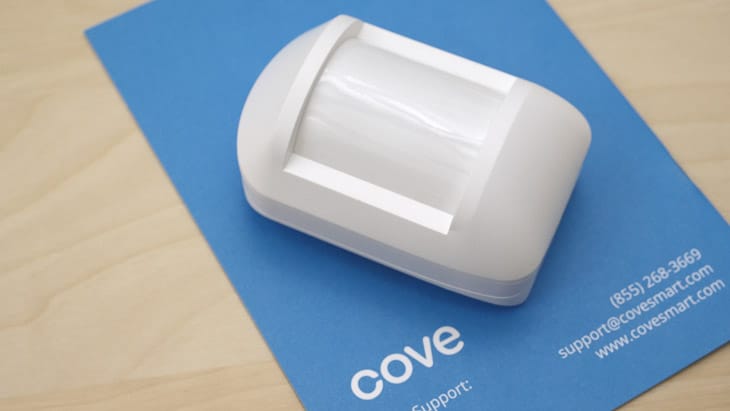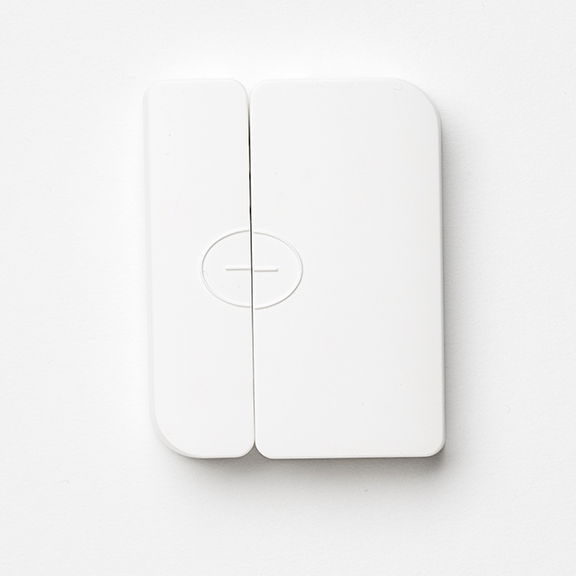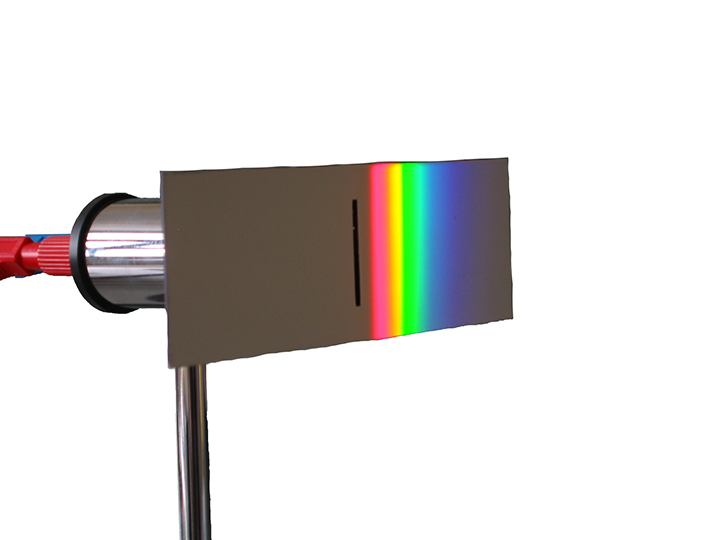Safer or More Safe? And Why?
Link Copied
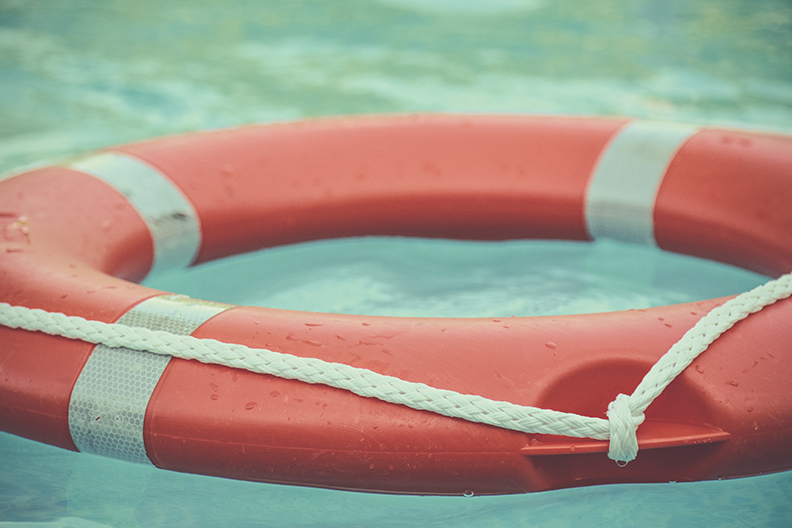
English is sometimes the worst. We have plenty of colloquial language that doesn’t follow set grammatical rules. One of the most common grammar questions is about the correct comparative form of the word “safe.” Is it “safer?” or “more safe?” In the US, both forms can be used, but “safer” is more common and more correct. Grammarly uses the form “safer,” as do many other programs including Microsoft Word.
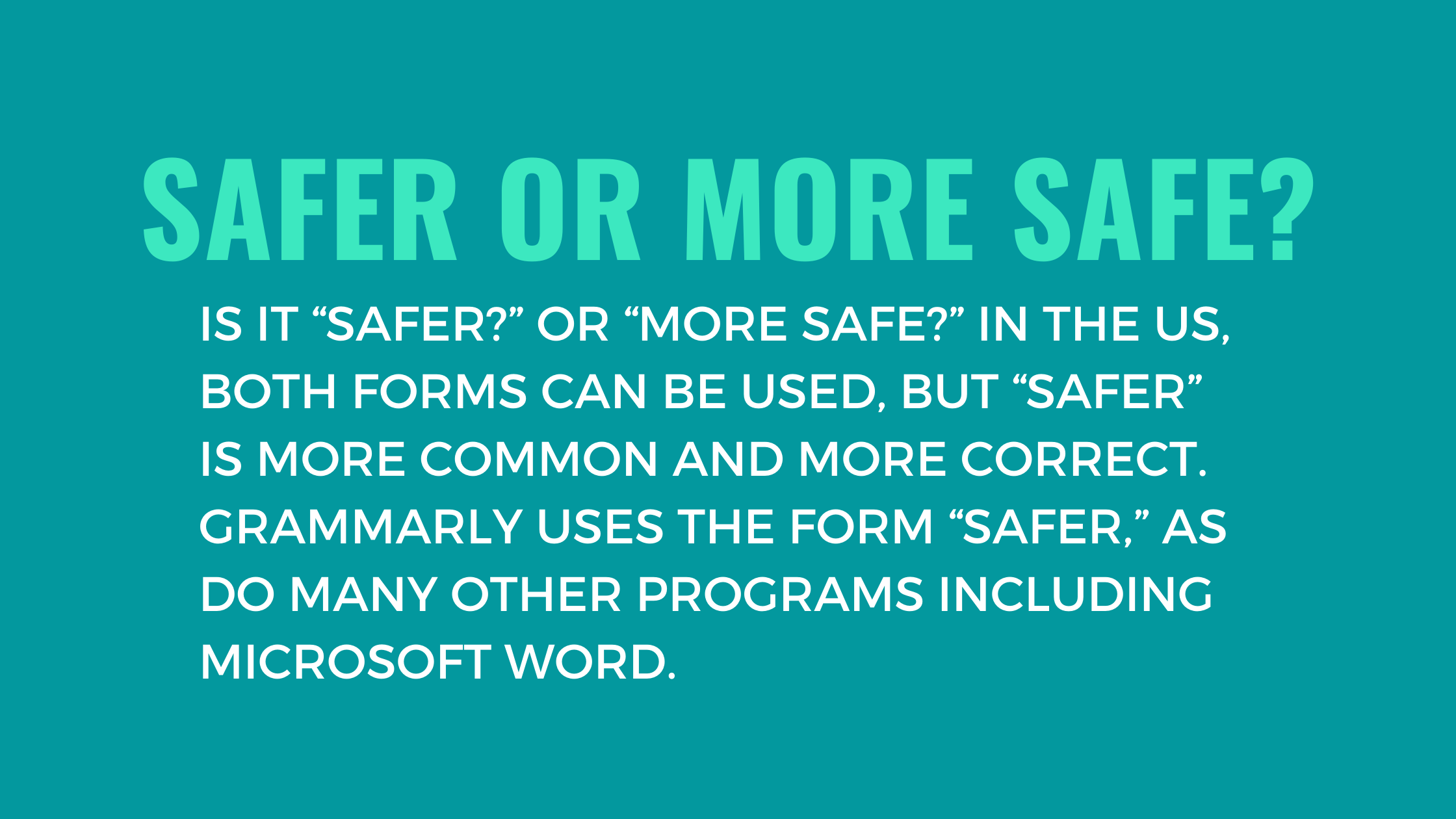
Examples
Safer is a comparative adjective, meaning that it describes a noun.
Here’s an example: “This car is safer than that car.”
You can dissect this sentence by first identifying the subject (noun), predicate (verb), and object (noun).
“This car” is the subject in this sentence, the predicate (verb) is “is,” and the object is “that car.” “Safer” is a comparative adjective. It modifies the subject, “this car,” in comparison to the object, “that car.”
The word “more” would be added when the adverb “safely” is used.
Example: “This car drives more safely than that car.”
In this situation, the subject and object remain the same as in the previous example (“this car” and “that car” respectively), and the verb “drives” is modified by the adverb “safely” and the comparative “more.”
The noun form of the word “safe” is “safety.”
Example: A security company’s slogan could be, “Your safety is our number one priority.”
In this sentence, the simple subject is “safety,” the predicate (verb) is “is” and the simple object is “priority”. “Your” and “our” are both possessive pronouns, and “number one” acts as an adjective, modifying the word “priority.”

Practicing
Here are a few examples so you can test yourself. Try and choose the more correct form of “safe” below:
- “My school hosts a safe seminar each year.” OR “My school hosts a safety seminar each year.”
- “How can we make our website safer?” OR “How can we make our website more safe?”
- “Following the correct procedures will keep you more safely than ignoring the procedures.” OR “Following the correct procedures will keep you safer than ignoring the procedures.”
- “You should not run at night because it is not safe.” OR “You should not run at night because it is not safer.”
- “Safe handling practices are a key part of gun ownership.” OR “Safely handling practices are a key part of gun ownership.”
- “Many shootings occur because of inadequate safety measures.” OR “Many shootings occur because of inadequate safer measures.”
Here are the correct answers:
- The second sentence is more correct because the seminar is about safety, and while I’m sure the atmosphere is secure at the school seminar, this sentence is describing the subject of the seminar, not whether the room is safe.
- The first sentence is more correct. While “more safe” technically is not incorrect, “safer” is the more common comparative form of “safe” in English.
- The second sentence is more correct. “Safer” is modifying the gerund noun form “following,” not the verb form.
- The first sentence is more correct. The second sentence has no source of comparison. Safer than what?
- The first sentence is more correct. “Safe” is an adjective that modifies the noun “handling practices.” Remember, “safely” is an adverb, not an adjective.
- The first sentence is more correct. The noun form, “safety” works better in this sentence. Also, in the second sentence, “inadequate safer” is a contradiction.
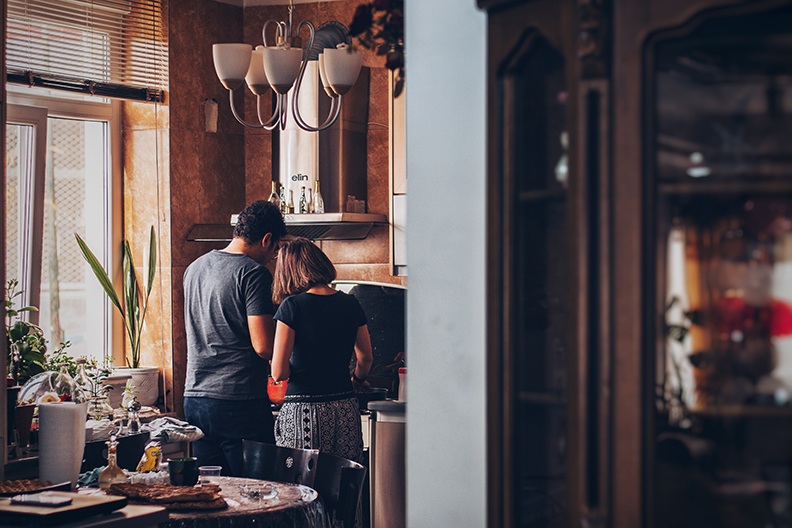
Keeping Yourself the Safest
We’ve discussed a lot in this post about comparative adjectives, but one form we haven’t talked about at all is “safest.” “Safest” is the goal. We all want to live in the safest neighborhood, to send our children to the safest schools, to move to the safest cities. Why is that? Because safety really should be our number one priority.
If there’s anything that this coronavirus pandemic has taught me, it is that we need to be doing a better job of protecting ourselves and our neighbors, whether from health problems or other dangers. By taking measures to increase our own safety, we actually increase the total safety level of the whole community. This is why we stayed home from work and school, not just to protect ourselves from the pandemic, but to protect all of the people with whom we interact.
So how can we integrate the safest practices into our lives?
Safety Begins At Home
The most important place for you to feel secure is at home. Home is where you keep all of your worldly possessions, and it’s where you live with the people you love. Safety principles at home are key. A few of the most common home accidents that occur are:
- While cooking, something catches fire
- Carbon monoxide leaks from furnaces or water heaters
- Unlocked doors and windows lead to burglary
- Slipping in the shower and hitting your head
These are all fairly common accidents, and a lot of them require very simple fixes. If something catches fire, for example, you’ll want a couple of things: a fire extinguisher, a smoke detector, and a phone to call 9-1-1 if the fire becomes too large. For a carbon monoxide leak, since carbon monoxide is a colorless and odorless gas, you will be unable to identify it without the help of a carbon monoxide detector. For your doors, locks are the simplest fix, and you can improve your system further by installing a few doors and windows. In terms of shower safety, it is important to have mats in the bathroom to help mitigate the slipperiness of the surfaces, and it’s also helpful to have a way to contact the authorities should any of these things occur.
If you’re interested in reading more about home safety, visit Covesmart.com.
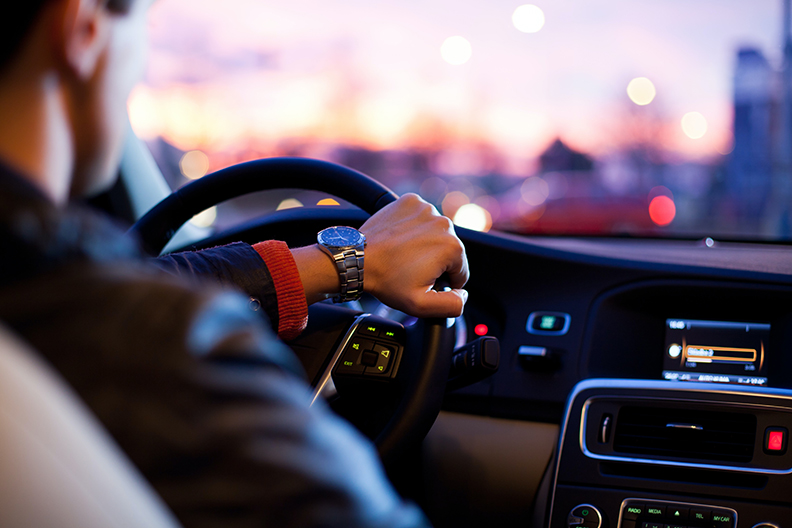
Safety On the Road
Most accidents involving serious injury occur on the road, whether you’re a pedestrian, a cyclist, or you’re driving a car. In the U.S., we have some pretty strict laws about road safety. Here are the 5 best ways to stay safe while on the road:
- Do not text, eat, or do anything else that distracts you from the road while traveling. This is most important for drivers, but it can affect cyclists and pedestrians as well.
- Make sure to utilize the safety features your vehicle requires. For bikes, this means wearing a secure helmet. For drivers, this means ensuring that everyone in your car is buckled up.
- Avoid traveling at night. As a pedestrian or cyclist, you are much more difficult to see by night. As a driver, it can be difficult to see, especially when there are no headlights.
- Obey all traffic lights and signs. Most drivers don’t struggle with this too much, but cyclists and pedestrians need to watch the lights as well. Wait for the walk sign.
- Always signal your intention. For cyclists, this means using the correct arm signals, and for drivers, it means turning on blinkers at least 3 seconds before you turn or switch lanes.
Following these few basic rules can help to keep you perfectly safe during your commute.
Safety At Work
We all have day jobs, and it’s important that we create safe work environments for ourselves and our coworkers. Each company has different safety regulations that they are required to follow. If you notice that these regulations are not being followed, it’s okay to step forward and ask for better training. If you’ve seen the episode of The Office in which Dwight creates a “simulated” fire, you know that’s exactly the wrong way to do things. If you haven't you can view it below.
In the case of a fire, tornado, or another catastrophe, your building should have the following: An assigned employee in charge of ensuring the safety of everyone in the area, a safe place of shelter, smoke detectors, and the correct emergency exits and a clear procedure for vacating the premises.
If you work in an industrial setting, make sure that you are familiar with the correct safety procedures for operating any heavy equipment. You should also ensure that you are prepared in the case of equipment malfunction.
Safety At School
School safety is becoming an increasingly important issue in the wake of several school shootings that have occurred. Most schools ban students from bringing weapons of any kind to school, but unfortunately, many students still carry them with them. When I was in high school, I remember that a male student brought a knife in and stabbed his ex-girlfriend. While I believe they were both okay, the fact that this event occurred highlighted some of the problems with the school’s safety system.
Many schools mitigate this risk by installing metal detectors at the doors of their school, and they have security guards search the students before they enter the building. While this method is effective, it doesn’t necessarily create an atmosphere that feels secure for students. Many other schools feel that the best way to deal with these issues is to provide emotional safety for students through counselors and faculty outreach.
Other important safety procedures to have in place at school are:
- Set emergency procedures, with drills for students to practice
- Sufficient security guards to protect students
- Background checks for teacher and staff
Safety on the Internet
Internet safety is becoming more and more important as our lives transfer to the internet. Everything from our banking information to our social security number is floating around the internet somewhere. In addition, scam sites including pornography sites and fake sales websites gather information from many people.
Here are a few good rules of thumb when it comes to internet safety:
- Only visit websites you trust. If you visit other websites, make sure not to give any personal information away.
- Actually read the terms and conditions for the websites you visit. You’d be surprised at some of the things these sites are tracking.
- Do not enter your social security number unless you absolutely must.
- Do not respond to email scammers with any information about yourself.
- Avoid porn and other websites that are not secure. Report any instances of child pornography that you come across.
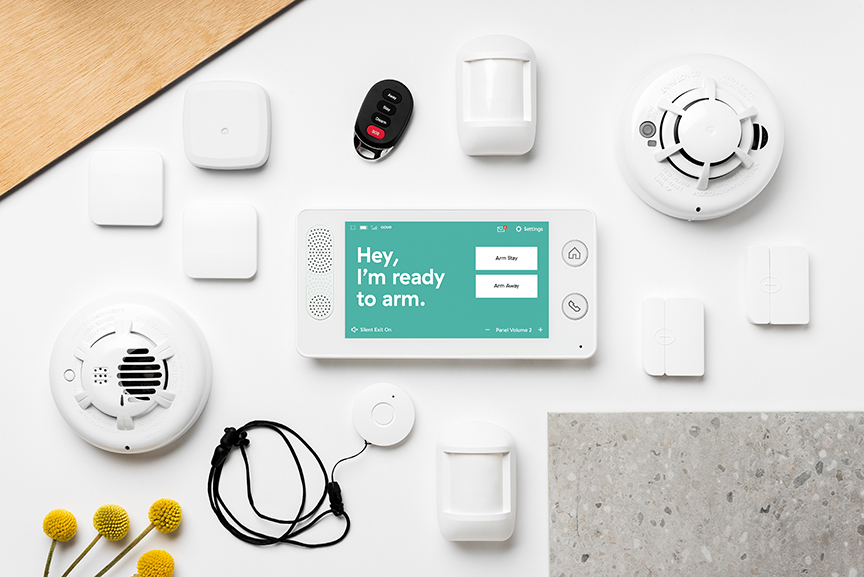
Full-Life Safety
At the end of the day, safety is about your life. I hope that the principles we’ve outlined are helpful as you try to keep yourself a little safer. Make sure that while you’re here, you check out Cove’s website. Cove is a DIY home security company with no required contract. Our systems are easy-to-use and cost-effective. Our whole purpose is to keep you safe, so check us out!
Ready to get started?
Take this short quiz to build your customized system today!
Takes less than a minute
